Moonraker begins not with a bang, but with two bangs. Bond is testing a new machine in the shooting range, a duel with a computer opening the novel in apt fashion. Published in 1955, the third of Ian Fleming’s James Bond novels concerns the public fears of that point in time. The huge progress in technology in regards to warfare is just one of them. The insightful opening also places Bond in his London headquarters from the very start of the novel, as well as beginning with some action, allowing for a much better narrative flow than the ‘in medias res’ openings of the last couple of novels, which begin well but ultimately drag when it comes time to catch the reader up.
 The opening few chapters, which see Bond go about his daily life in the offices of the Secret Service, paves the way for a more grounded novel than his previous adventure, Live and Let Die. Unlike the 1979 film which shares the novel’s title and proves to be an incredibly loose adaptation, Bond never leaves Earth. In fact, he never leaves England. This tight focus becomes important to the themes and ideas of the book but I could see being frustrated with Bond’s lack of travel if I read the novel when it was first published. This is a series partially defined by its globetrotting and Moonraker ignores that aspect. Or more so, subverts it. But now, with 12 original novels, multiple short stories, and 25 films, the setting makes it fascinating as a novelty.
The opening few chapters, which see Bond go about his daily life in the offices of the Secret Service, paves the way for a more grounded novel than his previous adventure, Live and Let Die. Unlike the 1979 film which shares the novel’s title and proves to be an incredibly loose adaptation, Bond never leaves Earth. In fact, he never leaves England. This tight focus becomes important to the themes and ideas of the book but I could see being frustrated with Bond’s lack of travel if I read the novel when it was first published. This is a series partially defined by its globetrotting and Moonraker ignores that aspect. Or more so, subverts it. But now, with 12 original novels, multiple short stories, and 25 films, the setting makes it fascinating as a novelty.
Bond sat in his office, catching up on paperwork and chatting to his secretary Loelia Ponsonby, may sound less engaging than the agent infiltrating a villain’s lair and shooting his way out, but it’s not. The chapter is my favourite of the novel, maybe even of the series so far. It’s the best look at Bond as an actual human yet. He worries about the other 00s and checks on the progress of their missions. They feel like colleagues, if not friends, far more so than in any of the films. There are only three of them – 007, 008, and 0011 – and they share an office, where they spend most of their time. Bond receives only two or three assignments per year and for the rest of the time he’s in the office or the canteen. When he’s not golfing or sleeping with any of the three married women he’s seeing, that is. Moonraker offers great insight into all aspects of Bond’s life and character.
 In an attempt to disrupt the formula of the novels that is already forming, instead of a usual mission briefing M asks Bond for a personal favour and meets with him at a gentlemen’s club. Again, Fleming fleshes out the paternal, respectful relationship between Bond and M in Moonraker, and we even learn M stands for Miles. The club is named Blades and is described in such a way that at any moment you’re expecting a Belinda Blinked-style sex party to break out. The waitresses are hired for their beauty and can even be taken to a private room at the end of the night, something Bond enjoyed in France before the Marthe Richards law spoiled all the fun.
In an attempt to disrupt the formula of the novels that is already forming, instead of a usual mission briefing M asks Bond for a personal favour and meets with him at a gentlemen’s club. Again, Fleming fleshes out the paternal, respectful relationship between Bond and M in Moonraker, and we even learn M stands for Miles. The club is named Blades and is described in such a way that at any moment you’re expecting a Belinda Blinked-style sex party to break out. The waitresses are hired for their beauty and can even be taken to a private room at the end of the night, something Bond enjoyed in France before the Marthe Richards law spoiled all the fun.
Thankfully, M hasn’t invited Bond for that purpose and instead wants him to play cards with Sir Hugo Drax, a national hero currently building ‘the Moonraker’, a super atomic rocket. Drax cheats at cards and if this gets out the scandal would destroy him and the country could be at risk without his rocket. The two intelligence officers seek to protect Drax from himself and reveal to him that they know his secret in an effort to make him stop.
Drax is a war hero. A knight of the realm. An admirable rags-to-riches success story. The protector of Cold War Britain. He’s also a megalomaniacal supervillain, but we’ll get to that later. Until the big reveal, which is obvious to the reader yet every character remains oblivious until its almost too late, Drax is revered by Bond and M. They buy into his story of being a returning amnesiac from the war – which is something of a repeat of Le Chiffre’s backstory – and that he’s putting his new fortune towards the security of his beloved home nation. He’s paying for the Moonraker rocket out of his own back pocket. Drax is the 1950’s answer to Elon Musk, who is as close to a Bond villain as you can get in the real world.
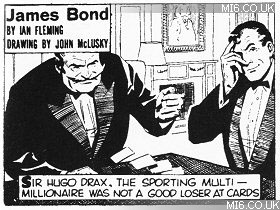 Drax’s apparently righteous agenda means that Bond overlooks his flaws. He’s deformed, in another example of Fleming’s trademark ableism, with some botched surgery leaving him with shiny skin and an overly large right eye. But even aside from his injuries, Drax has long thumbs, big teeth, and Fleming is obsessed with how hairy his face is. Oh, and he’s also a loud-mouthed braggart. As Bond puts it, it’s “as if he was dealing with human muck so far beneath contempt that there was no need to put up even a pretence of decent behaviour in its company.”
Drax’s apparently righteous agenda means that Bond overlooks his flaws. He’s deformed, in another example of Fleming’s trademark ableism, with some botched surgery leaving him with shiny skin and an overly large right eye. But even aside from his injuries, Drax has long thumbs, big teeth, and Fleming is obsessed with how hairy his face is. Oh, and he’s also a loud-mouthed braggart. As Bond puts it, it’s “as if he was dealing with human muck so far beneath contempt that there was no need to put up even a pretence of decent behaviour in its company.”
Bond easily notices how Drax is cheating at bridge and creates a plan to cheat himself, which Drax will be able to notice but not reveal without revealing himself to be a cheat. After a long tense build up Bond is about to enact his plan and sit opposite the villain but first… dinner! What follows is probably the most detailed description of food and drink in the series yet, and that’s saying something. It interrupts the pacing but it’s also much more relevant this time round. It places Bond in a world of aristocracy and snobbery and gives him time to comment on it. He sees Blades as an empty social pantomime that means nothing to him, although he loves gambling and describes it as the most exciting spectacle in the world. Bond is a regular Donny while stationed in England – he’s out of his element. He feels much more comfortable abroad and his job has forever changed him in a fascinating ‘you can’t go home again’ way. “Bond knew there was something alien and un-English about him”.
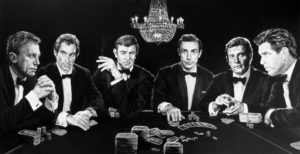 Once the card game begins, there are chapters dominated by bridge talk, with rubbers and shiners and all manner of things I don’t understand. They weren’t playing Top Trumps so I didn’t know what they were talking about despite the explanations and even a diagram that Fleming throws in. But it works because it’s not about the specificities of the game. This is personal. Insults are thrown and the drama is the war between Drax and Bond, the battlefield just happens to be a green velvet table. It’s tense and genuinely gripping, seeing how they cheat and the ploys at play, like Bond’s feigned drunkenness. It’s a better card game than the one at the centre of Casino Royale. In that review I said card games work better in movies than on the page but Fleming may have now convinced me otherwise. Not bad considering Moonraker was originally a screenplay idea that was too short for a novel so Fleming just ungracefully plopped the first third of the book on afterwards.
Once the card game begins, there are chapters dominated by bridge talk, with rubbers and shiners and all manner of things I don’t understand. They weren’t playing Top Trumps so I didn’t know what they were talking about despite the explanations and even a diagram that Fleming throws in. But it works because it’s not about the specificities of the game. This is personal. Insults are thrown and the drama is the war between Drax and Bond, the battlefield just happens to be a green velvet table. It’s tense and genuinely gripping, seeing how they cheat and the ploys at play, like Bond’s feigned drunkenness. It’s a better card game than the one at the centre of Casino Royale. In that review I said card games work better in movies than on the page but Fleming may have now convinced me otherwise. Not bad considering Moonraker was originally a screenplay idea that was too short for a novel so Fleming just ungracefully plopped the first third of the book on afterwards.
After besting Drax at cards, Bond is sent to his Moonraker facility to investigate the death of a British agent on the site, killed by one of the 50 German workers on the premises. Whereas it didn’t in Live and Let Die, a novel full of racism, the 1950’s sensibilities work in Moonraker and paint a captivating picture of the early Cold War. In this time capsule story, there is an equal fear and fascination of rockets and nuclear weapons. Bond is “dazzled by the terrible beauty of the greatest weapon on Earth.” War has changed and there’s now a clear and constant threat to British shores rather than agents and soldiers playing proxy wars in distant lands. Fleming even prophesises the next 50+ years of spy fiction: “These politicians can’t see that the atomic age has created the most deadly saboteur in the history of the world – the little man with the heavy suitcase.”
Once he arrives in Dover and sees the titular weapon for the first time, Bond meets again with Drax – who he falls desperately in love with again despite hating him at the card table – and the villain introduces Bond to his entourage. Here Fleming doesn’t even try to hide his cartoonish portrayal of Germans and describes Dr. Walter and Willy Krebs as “both caricatures – a mad scientist and a youthful version of Peter Lorre.” Yet it works, particularly for Krebs who is a fantastically disgusting henchman. He takes great pleasure in his work, which is revealed to be murder and torture, and Fleming is as obsessed with his slug-like neck as he is with Drax’s hairy face. Krebs is someone you love to hate and something of a revelation to me because I hadn’t heard of the character, with him not being adapted for any of the films. That was one of the joys of reading Moonraker: the film adaptation is so different that this was essentially an all-new Bond story where I had no idea what was going to happen. In maybe my favourite moment of the book, Bond finds Krebs searching his room and takes the opportunity to kick him up the arse like he’s Bishop Brennan in Father Ted.
At the rocket facility, Bond embraces his inner Sherlock Holmes and becomes a detective. I’ve always enjoyed the more investigative aspects of Bond’s profession and here Fleming fully embraces it, even gifting the secret agent with some fingerprint powder and a giant magnifying glass. Bond gathers a series of clues and tries to piece them together. A murder-suicide; a snooping worker; a pair of night glasses, a mysterious mark on a chart; why everyone working there has a moustache. “There was something positively obscene about this crop of hairy tufts,” Bond deduces. Although maybe Bond isn’t quite Holmes because his insights are often unremarkable: “Bond knew about filing cabinets.” Plus, Drax is obviously evil but Bond doesn’t see it until far too late.
 The Watson to Bond’s Holmes is Gala Brand, a Special Branch agent posing as Drax’s secretary. She’s a committed and capable police officer and while Bond finds her desirable, he also knows she’d be able to break his arm faster than he could break hers. Brand is easily my favourite ‘Bond girl’ of the novels so far, even if Fleming’s idea of a dedicated policewoman is initially cold, frigid and joyless just because she spurns Bond’s advances. Bond is, of course, frustrated by this, “He found her physically very attractive and it annoyed him to be unable to extract the smallest response. He felt a strong urge to give her a sharp kick on the ankle.”
The Watson to Bond’s Holmes is Gala Brand, a Special Branch agent posing as Drax’s secretary. She’s a committed and capable police officer and while Bond finds her desirable, he also knows she’d be able to break his arm faster than he could break hers. Brand is easily my favourite ‘Bond girl’ of the novels so far, even if Fleming’s idea of a dedicated policewoman is initially cold, frigid and joyless just because she spurns Bond’s advances. Bond is, of course, frustrated by this, “He found her physically very attractive and it annoyed him to be unable to extract the smallest response. He felt a strong urge to give her a sharp kick on the ankle.”
Yet despite frosty beginnings, Bond and Brand eventually form a partnership and a strong connection that develops both characters. Bond comes to respect Gala and she softens in his presence, although maybe a little too much because she suddenly begins gaily prancing through a meadow, picking flowers. Some of the book’s best moments are described from Brand’s point-of-view and it’s her who pieces everything together and discovers Drax’s plan. She’s fed up of playing the diminutive secretary and embraces her chance to break free from Drax’s hold. It’s amazing to see the huge progress from the terrible Solitaire just one novel and year prior to the women in Moonraker.
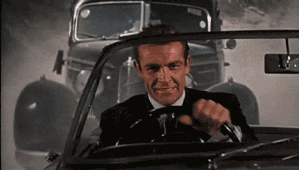 The action of the novel is backloaded but when it hits, it hits. Bond and Brand survive an assassination attempt when a chalk cliff falls on them and Drax’s shocked reaction when they return is stupendous. Then Brand is relegated to the damsel in distress when she’s captured and placed in the back of a car, leading to a car chase across London and Kent. “You don’t take a sick girl for a drive like a sack of potatoes!” decries Bond. The chase and its circumstances do very much feel like a repeat of Casino Royale but it’s still effective and, like the card game, better than that of the earlier book. Drax and Krebs best Bond by cutting the load off of a lorry and watching it tumble into Bond, “like the lavatory paper of a giant”, destroying his beloved Bentley.
The action of the novel is backloaded but when it hits, it hits. Bond and Brand survive an assassination attempt when a chalk cliff falls on them and Drax’s shocked reaction when they return is stupendous. Then Brand is relegated to the damsel in distress when she’s captured and placed in the back of a car, leading to a car chase across London and Kent. “You don’t take a sick girl for a drive like a sack of potatoes!” decries Bond. The chase and its circumstances do very much feel like a repeat of Casino Royale but it’s still effective and, like the card game, better than that of the earlier book. Drax and Krebs best Bond by cutting the load off of a lorry and watching it tumble into Bond, “like the lavatory paper of a giant”, destroying his beloved Bentley.
With Bond and Brand captured, Drax reveals his true identity and plan. He’s a Nazi, mistaken for an injured British solider at the end of the war because of his stolen uniform, and is planning to fire the Moonraker at London, like a giant hypodermic needle into the heart of England. I have to admit, I love a secret Nazi. It’s a villain trope that rarely fails. All a writer has to do is declare a character a Nazi and the reader’s thoughts do all the work. We hate them instantly. It might be cheap and easy but it works. And it works for Krebs too, as if we needed another reason to hate his guts.
 Drax’s hidden identity is also perfect for a book about post-war Britain and the nature of Englishness. Bond and Drax both visit places like Blades and pretend to be English. Drax literally so and Bond more philosophically. His time abroad has given him an exotic, foreign palate for most things and he feels uncomfortable in his home country. The weapon itself, the rocket, is chrome and acts as a mirror, reflecting back a distorted view of Bond and Drax that may hold more truth than their actual appearance. Yet in the end Drax is the catalyst for Bond becoming a classic English hero. Drax is actually Hugo Drache, which means ‘dragon’ in German, and Bond is St George, defeating the dragon and saving his homeland.
Drax’s hidden identity is also perfect for a book about post-war Britain and the nature of Englishness. Bond and Drax both visit places like Blades and pretend to be English. Drax literally so and Bond more philosophically. His time abroad has given him an exotic, foreign palate for most things and he feels uncomfortable in his home country. The weapon itself, the rocket, is chrome and acts as a mirror, reflecting back a distorted view of Bond and Drax that may hold more truth than their actual appearance. Yet in the end Drax is the catalyst for Bond becoming a classic English hero. Drax is actually Hugo Drache, which means ‘dragon’ in German, and Bond is St George, defeating the dragon and saving his homeland.
It’s at this point where the more grounded novel amps up the preposterousness, first by a fun degree and then into the realms of pure silliness. Bond and Brand escape using a blowtorch and a desk lighter and, while the countdown is on for the rocket’s imminent launch, decide to first have a shower and a drink in Drax’s private quarters. It stops the momentum dead but it soon builds again as the pair have to evade capture by staying in a vent and withstanding blasts of steam meant to flush them out. Fleming really wants you to know its dramatic by using so many exclamation points!!! It’s Gala who comes up with the plan to alter the gyros and send the rocket into the sea, using the knowledge she’s gained by being undercover, but Bond is the one to enact it while her part of the complex plan is simply to open a door.
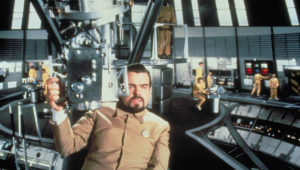 As the Moonraker blasts off, Drax delivers a brilliant speech to the nation which is full of euphemism hinting at his true goal and identity but the onlookers wrongly think he’s gloating about British nationalism instead of German. He’s truly a great Bond villain. Dastardly evil, charismatic, and not without a twisted sense of humour. I like Michael Lonsdale as Drax in the film adaptation but he’s the most restrained part of that movie and I enjoy the more garish Drax of the book. The action climax is great; both tense and comical. Bond is bunkered down, his job done, and listening to a BBC radio broadcast to see if he was successful. I always imagined this was a more recent phenomena in fiction, cutting back to a TV news report in a movie, but the entire finale is described live by a radio presenter. The announcer doesn’t know the truth and so hearing his reaction to Drax’s Nazi salute and a Russian submarine coming to pick him up is brilliant.
As the Moonraker blasts off, Drax delivers a brilliant speech to the nation which is full of euphemism hinting at his true goal and identity but the onlookers wrongly think he’s gloating about British nationalism instead of German. He’s truly a great Bond villain. Dastardly evil, charismatic, and not without a twisted sense of humour. I like Michael Lonsdale as Drax in the film adaptation but he’s the most restrained part of that movie and I enjoy the more garish Drax of the book. The action climax is great; both tense and comical. Bond is bunkered down, his job done, and listening to a BBC radio broadcast to see if he was successful. I always imagined this was a more recent phenomena in fiction, cutting back to a TV news report in a movie, but the entire finale is described live by a radio presenter. The announcer doesn’t know the truth and so hearing his reaction to Drax’s Nazi salute and a Russian submarine coming to pick him up is brilliant.
The end is ludicrous and maybe a little too much for even me to enjoy. Bond is successful and the rocket flies into the North Sea, exactly where Drax and his German brethren are escaping. After being such good villains, it’s a shame Bond couldn’t end Drax and/or Krebs himself, which he’s yet to do with an antagonist in the books. They die in a nuclear explosion. That’s right, a nuke explodes just off the coast of England! Surely this will have huge geopolitical and environmental repercussions, right? Wrong. M says that they’ve covered it all up. Just a mistake with the fuel and no one notices the mushroom cloud or lingering radiation. To save face Drax is deemed a hero who died by an unfortunate error and the Russian sub and Nazi salute were misconstrued in some way. It’s a disappointing end to an otherwise stellar Bond adventure.
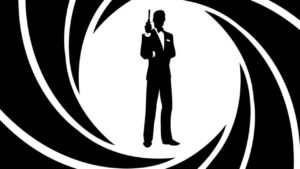 But it doesn’t quite end there. Bond suddenly goes all chaos theory and looks back over each step and decision that brought him to this point, starting back at the card game at Blades gentlemen’s club. I thought he was about to reveal he had some Jaffa Cakes in his pocket in an ode to Spaced considering how intense he was about it. Then we get an ending that had to be inspired by the masterpiece The Third Man. Having seemingly done everything right, Bond plans a romantic holiday for him and Gala and goes to meet her. But she denies him. She’s already engaged, something Bond would have noticed if he wasn’t so arrogant, and she walks past him, leaving him alone. Moonraker has given Bond definition as a character but that’s not who the world needs him to be. “He must play the role which she expected of him. The tough man of the world. The Secret Agent. The man who was only a silhouette”.
But it doesn’t quite end there. Bond suddenly goes all chaos theory and looks back over each step and decision that brought him to this point, starting back at the card game at Blades gentlemen’s club. I thought he was about to reveal he had some Jaffa Cakes in his pocket in an ode to Spaced considering how intense he was about it. Then we get an ending that had to be inspired by the masterpiece The Third Man. Having seemingly done everything right, Bond plans a romantic holiday for him and Gala and goes to meet her. But she denies him. She’s already engaged, something Bond would have noticed if he wasn’t so arrogant, and she walks past him, leaving him alone. Moonraker has given Bond definition as a character but that’s not who the world needs him to be. “He must play the role which she expected of him. The tough man of the world. The Secret Agent. The man who was only a silhouette”.
Stay tuned to OutofLives for my thoughts on the fourth of Fleming’s Bond novels, Diamonds Are Forever, in the coming weeks.




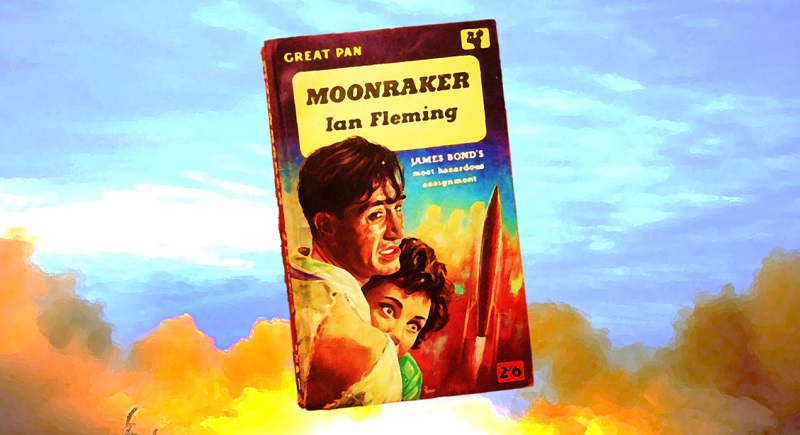

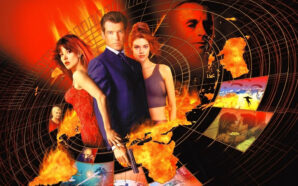

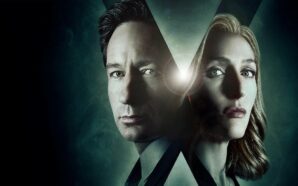
Moonraker is a great read and if you’re an espionage aficionado, an Ian Fleming follower, a 007 devotee and know who wrote the “Trout Memo” then by now you should have read Bill Fairclough’s epic spy novel Beyond Enkription in The Burlington Files series, written for espionage cognoscenti and real spies. Its protagonist, Edward Burlington aka Fairclough is just as “fast and furious” as any James Bond has been or even the Gray Man was meant to be but with one subtle difference: all his exploits in London, Nassau and Port au Prince are based on hard facts (some of which you can even check) and laced with ingenious spycraft tricks even espionage illuminati haven’t come across. By the way, Fairclough’s MI6 handler Mac knew Ian Fleming, Kim Philby and Oleg Gordievsky. No surprise then that John le Carré refused to write a series of collaborative spy novels with Fairclough given Philby ended John le Carré’s MI6 career. Little wonder then that in hindsight Ian Fleming was thankful that he didn’t work directly for MI6.